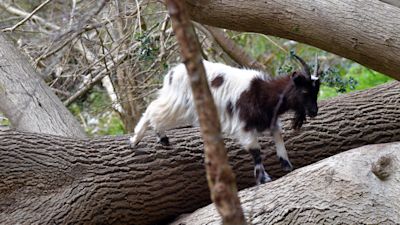Four new goats brought in to protect rare plants on Avon Gorge

Four billy goats have joined Avon Gorge's dwindling population to help control scrub and protect rare plants.
In 2011, six wild Kashmiri goats were introduced to the enclosure by Seawalls. They grazed on scrub, stopping it from stifling the growth of rare wildflowers and grasses, including the Bristol onion and the Bristol rock cress - which can only be found in the Avon Gorge.
All but two of the original herd have died - two were chased off the cliffs by dogs and two died of old age.
Bristol City Council had wanted to get four new Kashmiri goats from Wales but its plans were delayed by the coronavirus pandemic.
Instead four goats of another primitive breed were secured from Bristol charity, StreetGoat. Bristol City Council's grounds supervisor Ben Skuse said: “The amount of browsing and scrub control in the gully has been somewhat lacking when we’ve been down to two mouths, rather than six. So I’m very glad that we’ve been able to source some new animals.
"They’re quite a bit younger than our current goats, which is what we wanted.”
The four young Bagot goats joined the older Kashmiri goats in 'goat gully' in March.
The adults have distinctive long curved horns and the breed is said to be one of Britain's oldest types of goat.
Like the Kashmiri variety, they have primitive stomachs which means they will eat woody plants in preference to rare species.
Credit: Amanda Cameron, Local Democracy Reporting Service
Read more:
Bristol Zoo releases pictures of tiny mouse deer smaller than a pencil
Underwater camera films basking sharks feeding off the coast of Cornwall